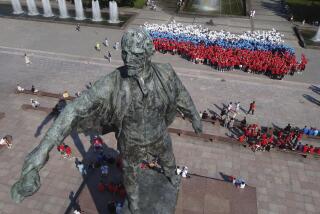In the Eastern Bloc, Moscow Backs Perestroika While Keeping Its Fingers Crossed
- Share via
It has been 20 years since Moscow put a brutal end to the Prague Spring and the Brezhnev Doctrine justified the invasion by reasserting the primacy of Soviet Bloc interests over national sovereignty.
The years of “normalization” that followed have produced an abnormal Czechoslovakia--corrupt, spiritually impoverished and economically stagnant. The country exemplifies the worst features of the Brezhnevism that Mikhail S. Gorbachev is now fighting in the Soviet Union. Ironically, Moscow, which 20 years ago crushed Alexander Dubcek’s attempt to give socialism a human face, now strives for the same goal.
From this follows the inevitable question: Would Gorbachev send in tanks if the Prague Spring were re-run? The answer must be that he would intervene militarily only if the crisis assumed proportions like Hungary in 1956, with open opposition to communist rule and direct threats to Soviet security interests, rather than the more moderate dimensions of 1968.
Such an answer clearly begs and forms part of a wider and more important set of questions about the changing relationship between the Soviet Union and Eastern Europe. Soon after becoming general secretary, Gorbachev examined policy toward Eastern Europe and found it wanting. Moscow had done little to prevent crises from developing and had imposed control--either directly as in 1953, 1956 and 1968 or indirectly as in Poland in 1981--in a clumsy, costly manner. As a highly pragmatic politician, Gorbachev favors a more flexible, lower-cost strategy that would make Eastern Europe fend for itself economically and politically. As a Soviet leader he knows that there is no cost-free East European policy that can perfectly balance the need for control with the need for self-sustaining and stable development of the region. The latter requires precisely the greater democracy and national autonomy that undermine the former.
Given his own problems in Moscow, Gorbachev knows that he must tread very cautiously in pressing perestroika on Eastern European conservatives; the last thing that he can afford is a crisis in the bloc. On the other hand, he believes that without perestroika Eastern Europe will continue to be economically and politically fragile. He is therefore pursuing a strategy that mixes more positive steering with more flexible acceptance of national diversity.
Three strands of this strategy stand out. The first is an energetic push for some economic rather than bureaucratic integration within Comecon that would help increase the flow of quality goods and technology to the Soviet Union. But progress toward production integration and a unified market presupposes compatible and reformed national economies as well as currency convertibility, neither of which is in sight. Moreover, Romanian and East German objections compound the difficulties of moving in this direction.
It is against the background of more assertive national interests within the Soviet Bloc that one should see the second strand of Gorbachev’s strategy--the use of more consultative methods of alliance management. East Europeans are now treated with greater respect at Comecon and Warsaw Pact meetings. Even Marshal Viktor G. Kulikov, the old-style commander of the Warsaw Pact, is reportedly less condescending to his East European subordinates. There are more multilateral meetings with real two-way exchanges of information and ideas. Moscow encourages debate and even asks East Europeans to bring forward policy initiatives. Needless to say, Moscow still has the decisive voice, but it brings this to bear in a more consultatively authoritarian way.
Greater consultation dovetails with the third strand of current Soviet policy in East Europe--a more ready acceptance of national diversity. Gorbachev gives greater theoretical legitimacy than ever before to national roads to socialism. Actual policy points in the same direction. There seem to be virtually no limits on economic experimentation. Poland is taking advice from the International Monetary Fund; Hungary has established an embryonic stock exchange and contemplates a large private sector. Yet both states are applauded in Moscow, where covert privatization, in the form of long-term leasing, is on the way.
The climate of perestroika also affords fairly wide scope for political change,and only the bottom-line limits survive--no opposition parties and no withdrawal from the Warsaw Pact. Moscow is now often keener on democratization than are local leaders, notably in Bucharest, East Berlin and Prague. For the first time in its history socialist Eastern Europe is falling politically behind the Soviet Union.
While in the short term the accommodation of national diversity serves stability and Gorbachev’s wider efforts to transform European detente into entente, his East European strategy carries definite risks. The demonstration effect of Soviet perestroika plus East European conservative constraint is an explosive mixture. The countries currently most resistant to change--Romania, East Germany and Czechoslovakia--are the most unstable domestically and tend to be the most troublesome in asserting national interests.
Political and economic weakness and growing heterogeneity in the Eastern Bloc at a time of increasing contact--including the recent Common Market agreement with Comecon--with a prosperous and fast-integrating Western Europe pose serious problems for Moscow. The Soviet ambassador in Bonn, Yuli A. Kvitsinsky, warned the recent Soviet party conference that East European states could be sucked into the Western orbit. So far Gorbachev has had little alternative except to follow his mixed strategy, yet the right balance between control and self-sustaining viability remains as elusive as ever. As conventional arms talks get under way and Moscow has to start thinking seriously about the future shape of European security, Eastern Europe will come to the fore as the most intractable foreign-policy problem facing Gorbachev.
More to Read
Sign up for Essential California
The most important California stories and recommendations in your inbox every morning.
You may occasionally receive promotional content from the Los Angeles Times.











